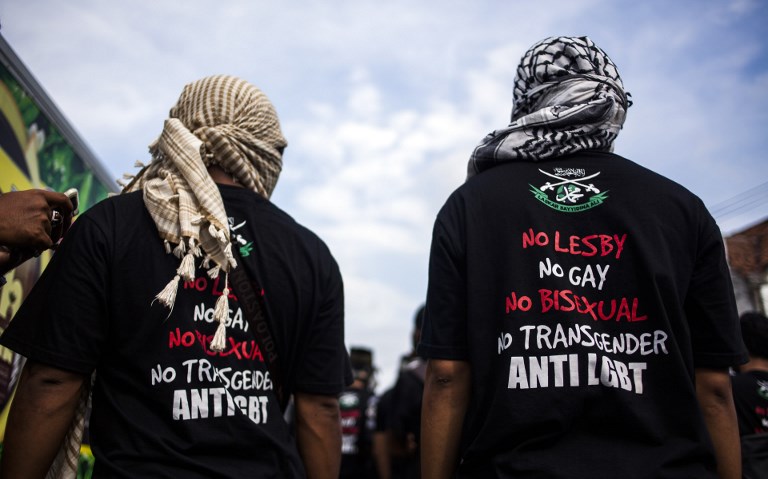Once considered a death sentence, decades of advancement in medicine have turned HIV/AIDS into a completely manageable disease. But advancements in science can only do so much when societal attitudes are regressing, which is how Indonesia finds itself with a growing HIV crisis caused by rising intolerance towards the country’s LGBT community.
That’s the case made in a new report released today by international NGO Human Rights Watch titled, Scared in Public and Now No Privacy’: Human Rights and Public Health Impacts of Indonesia’s Anti-LGBT Moral Panic.
The report argues that anti-LGBT rhetoric and crackdowns on the minority group by Indonesian authorities and vigilantes in recent years makes the government responsible for fueling the country’s current HIV crisis.
Many within Indonesia’s LGBT community say they are terrified by the virulent homophobia espoused by religious leaders and government officials as well as numerous news stories about gay clubs and spas being raided by authorities who casually out those caught up in the raids and find reason to arrest and imprison many — despite the fact that gay sex is not illegal in Indonesia (except in Aceh province, which has special autonomy to enact sharia-based laws).
According to HRW, it is this fear that is fueling the country’s HIV crisis. Scared of being arrested or outed, many gay men are now avoiding the clubs and spas where they could once congregate freely and where health outreach workers knew where to reach them.
“It is devastating that these clubs have closed – they were the only places where we could find the community,” said one HIV outreach worker in Jakarta quoted in the report. “Clubs were hot spots for us because we knew that even the discreet guys felt safe about their sexuality inside, so we could do HIV testing and give condoms and they wouldn’t be scared to participate.” Another outreach worker said that “we see more and more MSM men who have sex with men) waiting to get really sick before they seek help or even ask questions about HIV.”
In addition to raids by authorities, self-appointed moral vigilantes have also harassed and abused LGBT citizens, sometimes even raiding private homes. Rarely are such vigilante acts punished by authorities.
The report notes that the government’s overall response to the country’s HIV epidemic in recent decades has helped slow the number of new infections, but argues that the widespread stigma and discrimination against populations at risk of HIV, as well as people living with HIV, has discouraged many from accessing prevention and treatment services.
HRW argues that this is the cause of a dramatic five-fold increase in HIV rates among MSM since 2007, from 5% to 25%. And while most new HIV infections in Indonesia occur from heterosexual transmission, around one-third occur in MSM.
Earlier this year, Indonesian politicians seriously discussed plans to introduce laws in a new version of the country’s criminal code that would make homosexual acts between consenting adults illegal, although those articles have reportedly been removed or greatly toned down in the latest drafts of the bill. Even if that bullet is dodged, HRW says the government has to go much further to protect the country’s LGBT community.
“The vitriolic anti-LGBT rhetoric from public officials that began in early 2016 effectively granted social sanction and political cover to violence and discrimination,” said Kyle Knight, LGBT rights researcher at Human Rights Watch and author of the report. “To correct its course, the government needs to uphold its commitments to ‘unity in diversity’ by halting and investigating unlawful police raids and ensure discrimination is not enshrined in its laws.”




